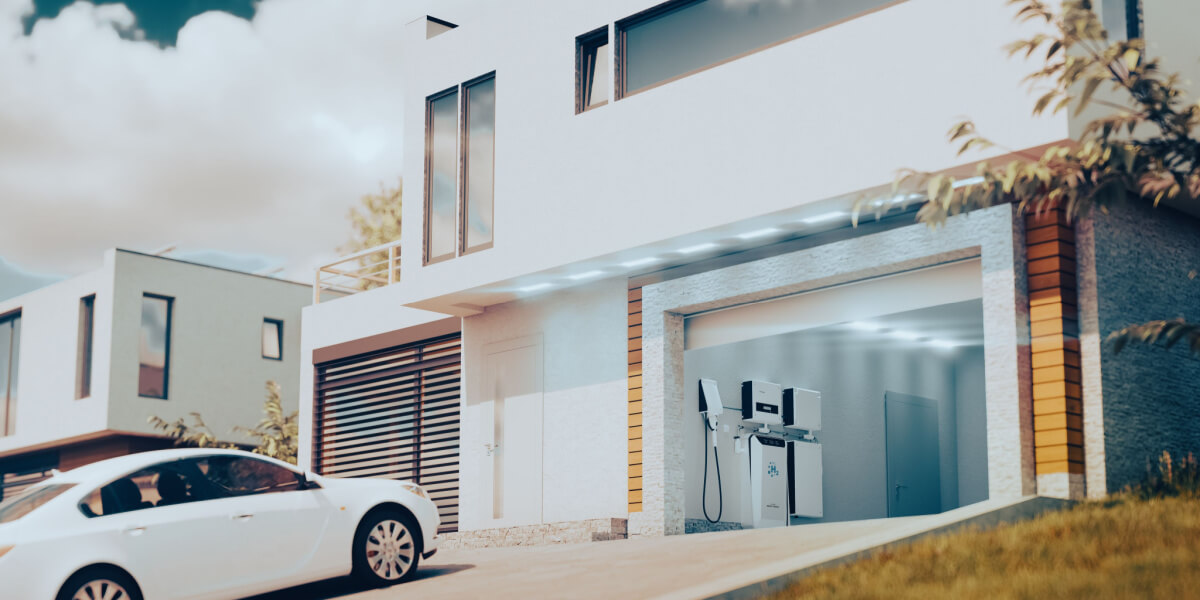Ever wondered what a solar hybrid inverter is and how it differs from a regular inverter? This Canstar Blue guide answers these questions and more.
The world of solar energy can be confusing. From panels to battery systems, the solar generation options available to households are expanding. One area that’s seen growth over the last few years is solar hybrid inverters. Solar hybrid inverters are slowly making a name for themselves, but what is it that makes these models stand out? And how do they differ from any old inverter?
In this article we’ll deep dive into the complex world of solar hybrid inverters, explaining how they work, the benefits they could bring to your home solar system and whether they are worth installing.
On this page:
Advertisement
What is a solar hybrid inverter?
A hybrid solar inverter is a solar inverter and battery inverter combined into one model. This type of inverter can convert both sunlight and energy stored in solar batteries into electricity.
Normally, two separate inverters are required for solar panels and solar batteries, as the energy running through these systems needs to be converted differently for household usage. A hybrid inverter eliminates this issue, combining both functions into one.
Solar inverter vs hybrid inverter Australia
As mentioned, traditional solar inverters can only convert energy from one source (panels-only or battery-only), and a hybrid inverter can convert energy from two (panels and battery).
A hybrid inverter can still generate power in the same way as any other kind of inverter. Its standout feature, however, is that it already has a built-in connection for energy storage systems. This means that if a household already has a battery, it can connect to that system straight away. It also means if a household decides to get a battery system added to their solar panels later down the track, it won’t need to purchase an additional inverter to help support the battery.
Why do you need an inverter?
Solar panels create direct current — DC — energy whereas household appliances generally run off alternating current — AC — electricity. An inverter converts the electricity generated by solar panels into energy compatible for household use. Without an inverter, the energy generated from a solar panel is practically useless in the home.
What can you do with a hybrid solar inverter?
Since a hybrid solar inverter is combining the functions of two separate systems, there are a few notable things it can do that a regular inverter can’t. Some functions you may find in a hybrid inverter include: grid-tie mode, hybrid mode, backup mode and off-grid mode. Please note, not all inverter manufacturers will include these specific features in each of their models.
- Grid-tie mode: The hybrid inverter defaults to simple solar inverter operations. In this mode, battery features are switched off.
- Hybrid mode: The inverter defaults to battery operation, working to help support the storage of excess solar energy during the day for use in the evening.
- Backup mode: The inverter acts as a backup power source during grid outages. Generally, this feature allows the system to automatically switch itself to this mode if an absence of grid power is detected. This is a less common feature among hybrid inverters.
- Off-grid mode: The inverter operates as its own power source and provides independence from the grid. It uses its own power to generate solar energy, power the home and charge any battery systems. Only a few hybrid inverters come with this feature.
You might also be interested in:
Compare solar plans
Here are some of the cheapest solar-specific deals from the retailers on our database. These costs are based on the Ausgrid network in Sydney but prices will vary depending on your circumstances. We show one product per retailer, listed in order of lowest price first. Annual price estimates assume general energy usage of 3900kWh/year for a residential customer on a single rate tariff. Price estimates exclude solar feed-in tariff credits. These are products from referral partners†. Our database may not cover all deals in your area, and please check retailer websites for up to date information.
Here are some of the cheapest solar-specific deals from the retailers on our database. These costs are based on the Citipower network in Melbourne but prices will vary depending on your circumstances. We show one product per retailer, listed in order of lowest price first. Annual price estimates assume general energy usage of 4000kWh/year for a residential customer on a single rate tariff. Price estimates exclude solar feed-in tariff credits. These are products from referral partners†. Our database may not cover all deals in your area, and please check retailer websites for up to date information.
Here are some of the cheapest solar-specific deals from the retailers on our database. These costs are based on the Energex network in Brisbane but prices will vary depending on your circumstances. We show one product per retailer, listed in order of lowest price first. Annual price estimates assume general energy usage of 4600kWh/year for a residential customer on a single rate tariff. Price estimates exclude solar feed-in tariff credits. These are products from referral partners†. Our database may not cover all deals in your area, and please check retailer websites for up to date information.
Here are some of the cheapest solar-specific deals from the retailers on our database. These costs are based on SA Power network in Adelaide but prices will vary depending on your circumstances. We show one product per retailer, listed in order of lowest price first. Annual price estimates assume general energy usage of 4000kWh/year for a residential customer on a single rate tariff. Price estimates exclude solar feed-in tariff credits. These are products from referral partners†. Our database may not cover all deals in your area, and please check retailer websites for up to date information.
Benefits of solar hybrid inverters
There are a few benefits that come from using a hybrid inverter in your home solar system. The most notable include:
- An all-in-one solution for solar panel and battery systems
- A battery-ready for future system expansions
- Low maintenance
- Backup power supply functionalities
- Centralised monitoring for your solar system.
How much do solar hybrid inverters cost?
A solar hybrid inverter can generally cost between $1,000 and $9,000. The final cost, however, will depend on several factors, including installation fees, the cost of the solar panels and the battery system costs (if you’re also installing one).
You can expect a solar hybrid inverter to cost more than an average string or battery inverter due to its advanced technology.
Should I get a solar hybrid inverter?
Ultimately, this decision comes down to your solar system’s needs and home energy usage. If you’re installing a solar power system for the first time, it might be worth looking into a solar hybrid inverter as a means to future-proof your panel system. This way there is some flexibility should you decide to add a battery system later on.
If you aren’t interested in battery storage, you can still get everything you need for your solar system from a standard string inverter. However, this option may mean that if you decide to add a battery system down the track, you’ll need additional inverters or equipment.
Before making any purchase decisions, it is best to contact a licensed solar installer who can evaluate your home’s energy needs and help you choose the inverter that’ll make the most of your solar energy. They’ll also consider your budget and solar energy goals and suggest an inverter that meets these needs.
If you are looking for an installer to help you with this process, you can find a selection of reputable companies in Canstar Blue’s latest ratings report. This annual review reveals which installers Aussie solar customers rated highly. To see the current winner, hit the link below.
Original reporting by Kelseigh Wrigley
Image Source: Douglas Cliff/Shutterstock




Share this article